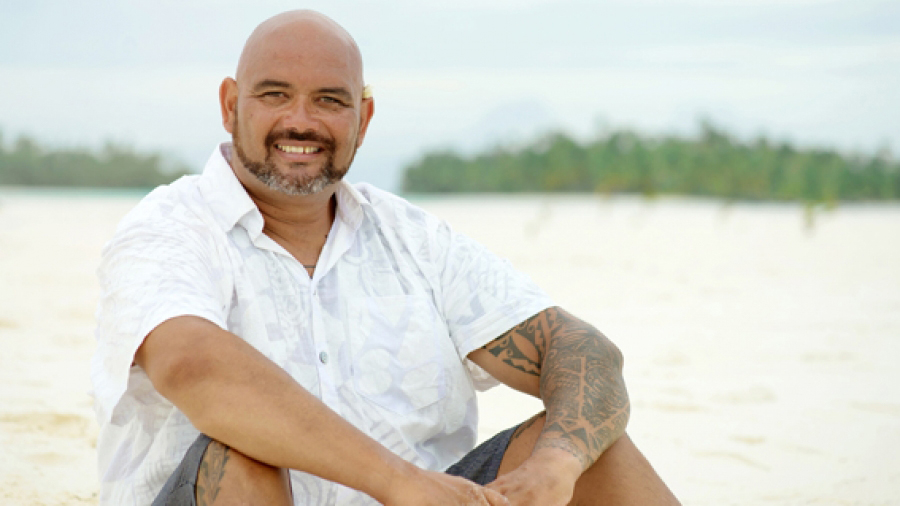Thomas Wynne: The vaka of language revitalisation
Saturday 19 August 2023 | Written by Thomas Tarurongo Wynne | Published in Editorials, Opinion

Columnist Thomas Tarurongo Wynne. Photo: CI NEWS/16040843
Ei’ia to matou Tu Oe? Where are our navigators? Because, kare o te Vaka to'ie'ie Tu Oe – A drifting Vaka has no navigator, writes Thomas Tarurongo Wynne.
As we have just finished celebrating Te Re Māori Cook Islands, I ask these two ui’anga, as this year’s theme in Aotearoa for ‘Epetoma o te reo Māori Kūki ‘Āirani – Cook Islands Language Week is ‘Ātuitui’ia au ki te au peu o tōku kāinga Ipukarea, which means, “connect me to the traditions and culture of my homeland”.
As much as it gives the more than 100,000 of us that identity as Cook Islanders, even if some at home struggle with that identification, every year it not only gives us the opportunity to celebrate our Reo Māori, it also sadly reminds us that despite the efforts of so many Reo Tu Oe like my Aunty Mata Teavae Partridge, Mama Upoko Tupou Manapori, Mama Tepaeru Tereora, Mama Teremoana Maua-Hodges, Papa Raemaki Temaeva Karati, Taiau Makirere Nicholas and Tauraki Rongo, with every year and every generation in Aotearoa, we are losing the battle to retain it.
I don’t want to spend any more time labouring the problem, that much is clear to us all. Instead, let us focus on a possible solution building on the work of our Metua. Because if we see the pathway for Te Reo Māori Aotearoa, we can see how we could revitalise our Reo Māori also.
So, I will pose three questions, framed around three kiato, as we all have a vested interest in our Te Reo Māori revitalisation for these same pressures and cultural changes are happening at home also. This is something I saw in the classrooms at Tereora where often only a third of the class could confidently hold a conversation in Māori.
The first kiato, as we build this vaka of language revitalisation is, do we apply pressure on the New Zealand government to make realm countries, Te Reo Māori Cook Islands, alongside Vagahau Niue and Tuvalu official languages of Aotearoa? This was a critical step in language revitalisation and preservation for Te Reo Māori Aotearoa – because what is legislated is budgeted and what is budgeted is resourced, and we need money to do this. God knows our people have paid enough in blood, sweat and taxes in New Zealand over the years to more than justify this investment.
The second kiato, is anywhere our people are, we need Kohanga, like we have at the CIDANZ complex in Mangere, so we can stop the rot at the bottom of the challenge before us, as well as the legislation and budget at the top of this vaka. If it takes a generation to lose a language and two to get it back, we must start now and build Kohanga or lose another generation to English.
But most importantly, the last part to the solution – the kiato that sits in the middle, and that is our Te Reo Māori teachers and speakers at home – this is the circle back where so many years ago, language got left behind. And what was left behind, those at home have tauturu and tiaki and looked after, and now we need you to help us breathe life into the more than 80 per cent of 100,000 Cook Islanders that hunger, desire and long to be connected as you are also to our Reo Māori.
Is this how we could possibly tarai, ia te vaka no te au tere vaka ki mua, carve out our vaka for the journey ahead, because if so, we will need us all, to tatou iti tangata, your te Reo Māori teachers, and love for our language to make this happen. As much we talk of people leaving for job, resources, and skills overseas, here is a prime example of where we as a people in Aotearoa need to turn our Vaka home and circle back to feed us what we so desperately need here in Aotearoa. We need us all, e vaka eke noa, in this Vaka of language revitalisation, if we are to build on what has been done, to link with our Ipukarea and bring change that will benefit us all for generations to come.











































